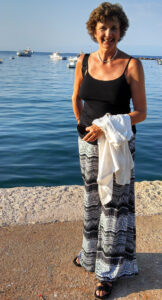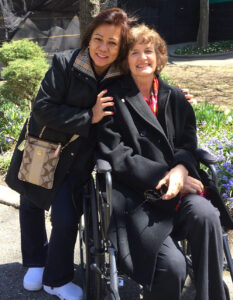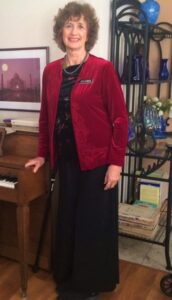Living Into My Life
Sometimes it is by going down into the abyss that we recover the treasures of life. – Joseph Campbell

My life has been a deeply meaningful and exciting adventure. I have traveled to the most remote and difficult regions of the world for my work with humanitarian agencies, and I wouldn’t have changed a moment of it. I grasped on to life’s opportunities and tackled challenges with courage and enthusiasm.
More recently, I have embarked upon a different journey – one that I never expected to travel. I am faced with a personal health issue: the rare, usually fatal Paraneoplastic Syndrome. I am challenged – as a disabled person. However, I know I’m more than a diagnosis. I’m a person who chooses to live life to the fullest in spite of my hardships. As Helen Keller once said, “Life is a daring adventure, or nothing at all.”
I confess, that before I became disabled and met people whom I experienced as having a disability, I pitied them. At times I felt guilty, because although I knew people with special needs, I went out of my way to avoid them. I felt uncomfortable, because I didn’t know how to respond appropriately to them.
I clearly remember the horrible grief I felt when the doctor told me the diagnosis: Paraneoplastic Syndrome – an incurable and usually fatal syndrome that would leave me disabled. I was in shock, devastated. In those few uttered words, everything I thought I knew about myself, how I viewed the world and my future, were forever altered. I was overwhelmed with despair.
When we are unable to function well, we might see little purpose in living and feel sorry for ourselves. If we aren’t living what we think of as a productive life, we may ask: “Why has this happened?” “What did I do to deserve this?”
Regrettably, as we get older, disabilities have a way of creeping up on us, preventing us from doing things we did earlier. Even if we are “able-bodied” now, a disability will likely be a part of our lives at some point.

Most of us hope we won’t be disabled. Research shows when people are asked what they fear most: loss of health and debilitating disabilities rank high on their list. Unanticipated disabilities can easily make us hostages of anger, self-pity, and depression. Initially, I was in denial about the losses I experienced. However, I couldn’t walk, care for myself, drive a car, work, travel, or live in my home. It was a humiliating and painful process.
Soon, I learned firsthand that people with any kind of disability are often discriminated against, stigmatized, and shunned – a hard lesson to learn when you are disabled. I’ve felt people try to avoid me, or flood me with extreme helpfulness to the extent that I truly felt helpless, and I have been hurt by their unintentionally disrespectful words.
All people, regardless of their physical or their mental ability, deserve respect. We must view disabled people as people who have the right and capability of fully engaging in life. And we must not prejudge or treat them as though something is wrong with them.
The difficulties of being disabled are daunting. However, we can choose to change that picture. It’s not easy when facing anguish and despair. Nevertheless, even in terrible times, we may discover surprising gifts buried somewhere in our lives: compassion, the desire to serve, wisdom, courage, hope.

From my own experience, I learned that growth can actually come from being disabled. I was surprised that my disability helped me learn what I am made of. I was forced to face my fears and losses, discover my strengths and capabilities, and appreciate people’s kindness and help. I began to pay attention to what was important in my life. Without a doubt, my disability taught me to be grateful for the gift of life. Remember: We might not be able to be cured or healed, yet we can choose how we respond to our challenges, no matter how difficult they are.
Yes, the Paraneoplastic Syndrome has limited my ability to walk. Still, I have learned what my skills and strengths are. Somehow, hope has interrupted my despair. So, I shall try to live fully into my new life. I am not a diagnosis. I am a woman who has much to contribute to the world.
* Do you know someone with a disability to whom you could do something kind and loving? What might that be?
* Has someone reached out to you when you were feeling badly and helped you? What did they do?
God, help us to treat all persons with respect and compassion. May we never judge disabled people as though something is wrong with them. Help us to remember they are people who have the right and capability to fully engage in life. Amen.
Joy Carol

Thank you for always being a joy of love and inspiration.
My life was touched the day I met you at Mayo. I knew immediately you were a very special and incredible person. I am a better person to have met you. I hope some day I will have the opportunity to see you again with my dog Phoebe.
Dear Mrs. Carol, my friend, Kay Scranton, is a former classmate of yours and understands you may be living close to her. She is going to leave a message with your present residence in hopes of reconnecting. She has no computer so depends on the telephone. Thank you! Judy Hinton